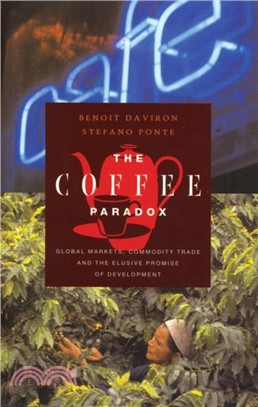The Coffee Paradox: Global Markets, Commodity Trade and the Elusive Promise of Development
商品資訊
ISBN13:9781842774564
出版社:Zed Books
作者:Benoit Daviron; Stefano Ponte
出版日:2005/11/01
裝訂/頁數:精裝/320頁
定價
:NT$ 5100 元優惠價
:90 折 4590 元
無庫存,下單後進貨(到貨天數約45-60天)
下單可得紅利積點:137 點
商品簡介
相關商品
商品簡介
Can developing countries trade their way out of poverty? International trade has grown dramatically in the last two decades in the global economy, and trade is an important source of revenue in developing countries. Yet, many low-income countries have been producing and exporting tropical commodities for a long time. They are still poor. This book is a major analytical contribution to understanding commodity production and trade, as well as putting forward policy-relevant suggestions for ‘solving’ the commodity problem.
Through the study of the global value chain for coffee, the authors recast the ‘development problem’ for countries relying on commodity exports in entirely new ways. They do so by analysing the so-called coffee paradox – the coexistence of a ‘coffee boom’ in consuming countries and of a ‘coffee crisis’ in producing countries. New consumption patterns have emerged with the growing importance of specialty, fair trade and other ‘sustainable’ coffees. In consuming countries, coffee has become a fashionable drink and coffee bar chains have expanded rapidly. At the same time, international coffee prices have fallen dramatically and producers receive the lowest prices in decades.
This book shows that the coffee paradox exists because what farmers sell and what consumers buy are becoming increasingly ‘different’ coffees. It is not material quality that contemporary coffee consumers pay for, but mostly symbolic quality and in-person services. As long as coffee farmers and their organizations do not control at least parts of this ‘immaterial’ production, they will keep receiving low prices. The Coffee Paradox seeks ways out from this situation by addressing some key questions: What kinds of quality attributes are combined in a coffee cup or coffee package? Who is producing these attributes? How can part of these attributes be produced by developing country farmers? To what extent are specialty and sustainable coffees achieving these objectives?
Through the study of the global value chain for coffee, the authors recast the ‘development problem’ for countries relying on commodity exports in entirely new ways. They do so by analysing the so-called coffee paradox – the coexistence of a ‘coffee boom’ in consuming countries and of a ‘coffee crisis’ in producing countries. New consumption patterns have emerged with the growing importance of specialty, fair trade and other ‘sustainable’ coffees. In consuming countries, coffee has become a fashionable drink and coffee bar chains have expanded rapidly. At the same time, international coffee prices have fallen dramatically and producers receive the lowest prices in decades.
This book shows that the coffee paradox exists because what farmers sell and what consumers buy are becoming increasingly ‘different’ coffees. It is not material quality that contemporary coffee consumers pay for, but mostly symbolic quality and in-person services. As long as coffee farmers and their organizations do not control at least parts of this ‘immaterial’ production, they will keep receiving low prices. The Coffee Paradox seeks ways out from this situation by addressing some key questions: What kinds of quality attributes are combined in a coffee cup or coffee package? Who is producing these attributes? How can part of these attributes be produced by developing country farmers? To what extent are specialty and sustainable coffees achieving these objectives?
主題書展
更多
主題書展
更多書展今日66折
您曾經瀏覽過的商品
購物須知
外文書商品之書封,為出版社提供之樣本。實際出貨商品,以出版社所提供之現有版本為主。部份書籍,因出版社供應狀況特殊,匯率將依實際狀況做調整。
無庫存之商品,在您完成訂單程序之後,將以空運的方式為你下單調貨。為了縮短等待的時間,建議您將外文書與其他商品分開下單,以獲得最快的取貨速度,平均調貨時間為1~2個月。
為了保護您的權益,「三民網路書店」提供會員七日商品鑑賞期(收到商品為起始日)。
若要辦理退貨,請在商品鑑賞期內寄回,且商品必須是全新狀態與完整包裝(商品、附件、發票、隨貨贈品等)否則恕不接受退貨。
























